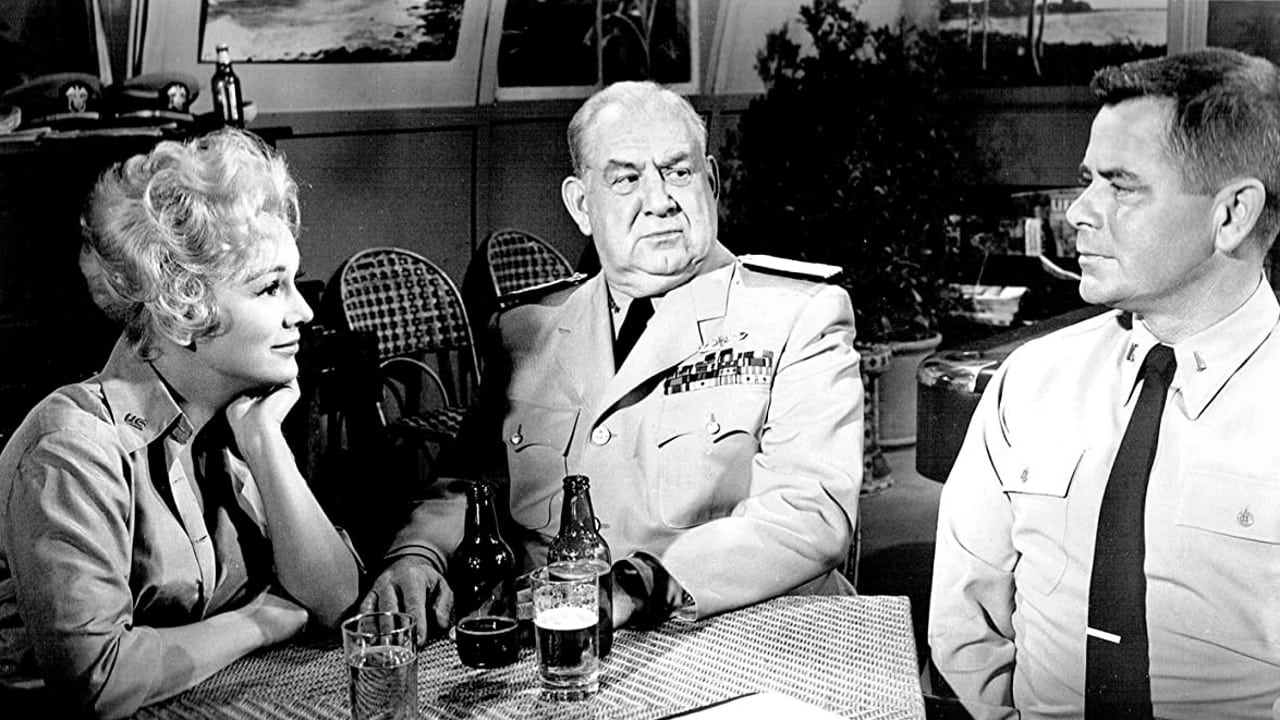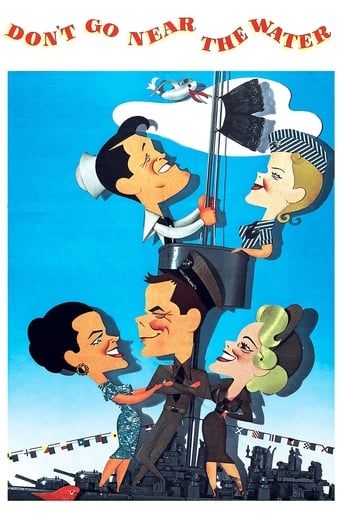

On a picturesque South Pacific island, during World War II, a US Navy base handles public relations. Unmarried star lieutenant Glenn Ford (as Max Siegel) takes visiting congressmen on a tour. Beautiful native schoolteacher Gia Scala (as Melora Alba) catches his eye. Enlisted sailor Earl Holliman (as Adam Garrett) likes the way pretty perfumed Anne Francis (as Alice Tomlen) "crosses her legs." Laidback young Russ Tamblyn (as Tyson) doesn't like washing teen-spirited sheets for war reporter Keenan Wynn (as Gordon Ripwell). Comic commander Fred Clark (as Clinton "Marblehead" Nash) is in charge. If you stick around, you'll see head-turning Eva Gabor (as Deborah "Debbie" Aldrich and foul-mouthed Mickey Shaughnessy (as Farragut Jones)...The all-star cast is likable. However, the juvenile romances, snickering innuendo and silly slapstick don't mix well. Best part is a very funny episode involving Mr. Shaughnessy reputedly using what is politely called "The F-word," but you have to wade through much tediousness to get there. The title "Don't Go Near the Water" refers to the fact that the characters play on dry land – well, until we see Ms. Gabor's lacy black underwear. This was based on a novel, which suggests there might have been a more interesting story somewhere. Although Glenn Ford was then too big a movie star to do it, this would have made a fine half-hour situation comedy starring Mr. Ford, Mr. Clark and Mr. Tamblyn, who provide a solid anchor and cover their demographics.***** Don't Go Near the Water (11/14/57) Charles Walters ~ Glenn Ford, Fred Clark, Russ Tamblyn, Earl Holliman
... View MoreAnother 50s service comedy that seemed like a pilot for a television series. You had the slapstick building of the officers club; the romance between the enlisted man and the nurse officer; the courtship of the native girl and Glenn Ford; the blackmailing of the journalist to repair the new school house; teaching the manufactured hero sailer to clean up his language when going out on Victory bond tours. Reasonabilty well done with a lot of familiar faces. One off-putting scene came towards the end when magazine reporter Eva Gabor sneaks off to experience an island assault. She comes back with her face smudged and cooing about how much she enjoyed the experience and how wonderful it was. I always thought those Pacific landings by Marines and solders were horrific blood baths, particularly if this was supposed to be Okinawa or Iwo Jima. I suppose if it was the first day of the landings, the heaviest fighting might not have begun, but we know that a steady stream of dead and wounded are on the way. There was no mention of casualties in this movie that emphasized the fun side of war.
... View MoreI rate William Brinkley's beautiful written and only slightly pretentious service comedy "Don't Go Near the Water" as the best satire to come out of WWII. There is nothing lightweight about his attempt here; he is writing from personal knowledge of this group of reporters about the hysteria, professionalism, patriotism, irresponsibility, hijinks and occasional hubris of the press who covered the War in the Pacific Theater-of-Operations. The head of the organization is a refugee from Wall Street, chrome-domed comedy genius Fred Clark, riding herd on a large group of bright, bored and nefarious group of minds who are looking to avoid duty or to do something that will shake up the world. Only two changes were made from the novel by Dorothy Kingsley's brilliant screenplay. One was to alter Max, the central character, from a big unattractive sort to handsome Glenn Ford; the other was to change the character played by Earl Holliman from a big handsome hunk to an ordinary- looking nice guy. One works; the other doesn't. But everything else, in my judgment, works like clockwork in this extremely memorable, funny and thought- filled narrative. Director Charles Walters kept the proceedings going professionally and well. The technical aspects of the movie are both good and usually so good they go unnoticed, because what matters in this story, I claim, is the characters and the actors who bring them to vibrant life. The storyline involved is simple. The correspondents get a Club built; Max handles one Farragut Jones, a foul-mouthed nightmare he helps create, by riding herd on him during personal appearances. He also baits Clark, his boos, and pursues a lovely island girl, played by Gia Scala, while facing five disruptions--an illicit liaison between an enlisted man and an officer, an obnoxious demanding journalist, a lovely female reporter who wants to see the shooting war up close, some visiting VIPs and Clark's interference in the challenge of building the Club which all upsets the dull daily routine of the newshawks. The large able cast is headed by Ford, Clark, Holliman, Anne Francis, A\Mary Wickes, Keenan Wynnn as the journalist, Eva Gabor as the female reporter, Mickey Shaughnessy as Farragut Jones, with Romney Brent as Scala's father, Jack Albertson and Charles Watts as the Representatives, Jeff Richards and Howard Smith. Bronislau Kaper supplied the music; the film produced a hit song. And when the atomic bomb is dropped on Japan, the film achieve a climax at a large bash, and a happy ending for Ford and Scala. The most hilarious and meaningful service comedy of which I have knowledge. its theme is really how men deal with responsibility, and everyone is memorable because the theme is so well- integrated with the War and its events. Kudos to William Brinkley for this absolute gem.
... View MoreThis tale of the absurdist goings-on at a public relations office for the navy in the WWII pacific theater is sort of a downscale "South Pacific." The casting and production values are extremely high, but the movie never aspires to anything more than light (extremely light) entertainment. In this it succeeds quite well. The movie is great to look at, and the comic abilities of Glenn Ford - an underrated actor, in my book - are at their peak. No lasting nourishment here, but a fun flick to see - once. Side note - the movie is another example of the superiority of the color processes employed in the 50's and late 40's over what is commonly used in today's flicks.
... View More